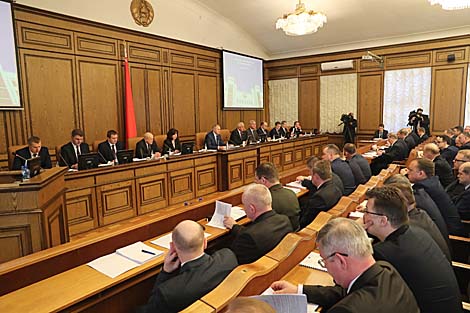Opinions & Interviews
Belarusian government to focus on making public sector more effective in 2019

MINSK, 19 February (BelTA) – Improving the effectiveness and the competitive ability of the public sector will be the key task of the government in 2019. Prime Minister of Belarus Sergei Rumas made the statement during the Council of Ministers’ session held on 19 February to discuss results of social and economic development in 2018, Q1 2019 estimates, and the achievement of key goals in 2019, BelTA has learned.
Sergei Rumas noted: “Improving the effectiveness and the competitive ability of the public sector of the economy, including republican and municipal enterprises, is a key task of the government in the near future. Right now market instruments for the financial rehabilitation of enterprises don’t work. At the same time many state-owned enterprises count purely on state budget support.”
 The prime minister reminded that the head of state had clearly specified requirements concerning the development and submission for approval of the measures designed to support enterprises. In line with these instructions the government no longer submits proposals to give direct budget support to enterprises for consideration of the head of state. “If an enterprise fails to meet state support conditions and fails to hit the targets set when state support was granted, the enterprise can no longer count on state support. If an enterprise truly grows, is about to secure stable and profitable operation, but cannot pay the accumulated debts on time due to objective reasons, the government may consider the possibility of restructuring the debts in exceptional cases,” explained Sergei Rumas. But all such steps will be closely overseen by the central government and may be followed by the replacement of the head of the enterprise.
The prime minister reminded that the head of state had clearly specified requirements concerning the development and submission for approval of the measures designed to support enterprises. In line with these instructions the government no longer submits proposals to give direct budget support to enterprises for consideration of the head of state. “If an enterprise fails to meet state support conditions and fails to hit the targets set when state support was granted, the enterprise can no longer count on state support. If an enterprise truly grows, is about to secure stable and profitable operation, but cannot pay the accumulated debts on time due to objective reasons, the government may consider the possibility of restructuring the debts in exceptional cases,” explained Sergei Rumas. But all such steps will be closely overseen by the central government and may be followed by the replacement of the head of the enterprise.
Apart from that, in 2019 the government will put efforts into establishing a corporate management system at state-owned enterprises. A draft presidential decree to that effect has already been forwarded for consideration of the head of state. It provides for appointing top government officials members of supervisory boards in the most important public joint-stock companies with a state share in their charter capital. “We would like to convert the supervisory board into a real staff, which shapes the strategy to beat the competition and – that’s important – oversees its implementation for the sake of achieving long-term development goals,” Sergei Rumas stressed.







 print version
print version make home page
make home page add to bookmarks
add to bookmarks

